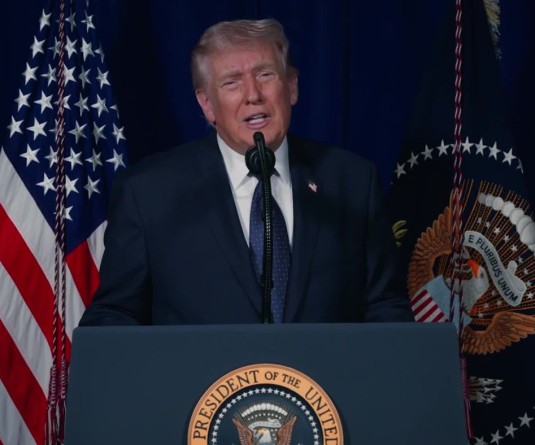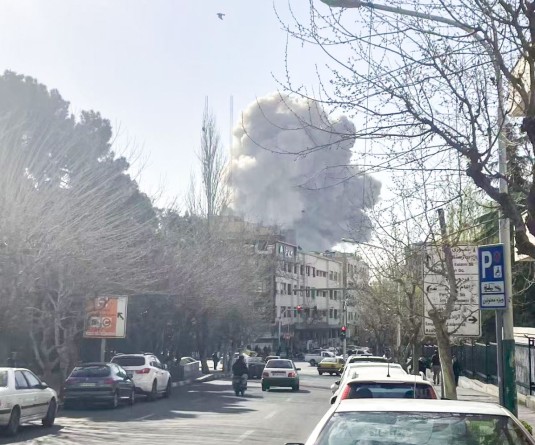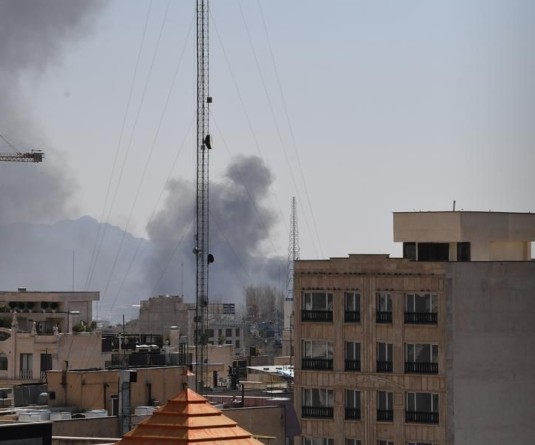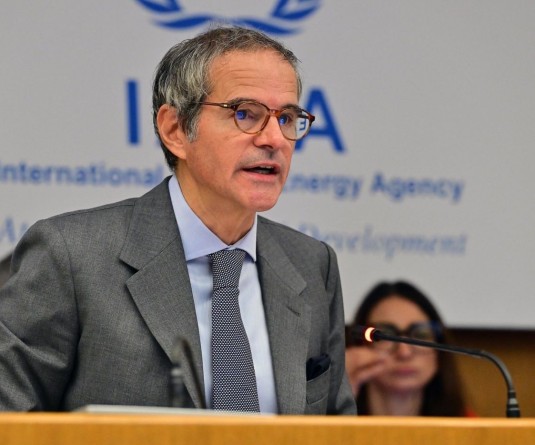
A Libyan man inspects destroyed military vehicles that belonged to pro Gadhafi forces at the site of a NATO air strike on the outskirts of Benghazi, Libya on Tuesday, March 29. International military forces are using words as well as weapons to try to weaken the grip of Libyan strongman Moammar Gadhafi and urge his troops to turn against him. (AP Photo)
TRIPOLI, March 30 (Reuters): Libyan rebels pulled out of the oil town of Ras Lanuf on Wednesday under heavy bombardment from Muammar Gaddafi's forces, showing up their weakness without Western air strikes to tip the scales in their favor. The rapid reverse comes just two days after the rebels raced westwards along the all-important coastal road in hot pursuit of the government army that had its tanks and artillery demolished in five days of aerial bombardment in the town of Ajdabiyah.
Gaddafi's army first ambushed the insurgent pick-up convoy outside the "brother leader's" hometown of Sirte, then outflanked them through the desert, a maneuver requiring the sort of discipline entirely lacking in rag-tag rebel force. On the offensive, government tanks and artillery have unleashed a fierce bombardment on towns and cities which has usually forced rebels to swiftly flee. That tactic appears to have worked once again in Ras Lanuf, an oil terminal town, 375 km (230 miles) east of the capital Tripoli.
"Gaddafi hit us with huge rockets. He has entered Ras Lanuf," rebel fighter Faraj Muftah told Reuters after pulling out of Ras Lanuf. "We were at the western gate in Ras Lanuf and we were bombarded," said a second fighter, Hisham. Scores of rebel 4x4 pick-ups raced east, away from Ras Lanuf, a Reuters journalist saw.
Without Western air strikes, the rebels seem unable to make advances or even hold their positions against Gaddafi's armor.
As the rebels retreated, a Reuters correspondent heard aircraft, then a series of loud booms near Ras Lanuf, but it was unclear if the sounds were the sonic boom of the jets or bombs. But a fighter returning from Ras Lanuf, Ahmed, also told Reuters: "The French planes came and bombed Gaddafi's forces."
France was the first member of the international coalition to announce that it had launched air strikes on Libya and rebels commonly credit most air strikes to French aircraft. A conference of 40 governments and international bodies agreed to press on with a NATO-led aerial bombardment of Libyan forces until Gaddafi complied with a U.N. resolution to end violence against civilians.
The Pentagon said on Tuesday 115 strike sorties had been flown against Gaddafi's forces in the previous 24 hours, and 22 Tomahawk cruise missiles had been fired. Britain said two of its Tornado fighter-bombers had attacked a government armored vehicle and two artillery pieces outside the besieged western town of Misrata.
Libya's official Jana official news agency said air strikes by forces of "the crusader colonial aggression" hit residential areas in the town of Garyan, about 100 km (60 miles) south of Tripoli, on Tuesday. It said several civilian buildings were destroyed and an unspecified number of people were wounded.
U.N. Security Council Resolution 1973 sanctions air power to protect Libyan civilians, not to provide close air support to rebel forces. That would also require troops on the ground to guide in the bombs, especially in such a rapidly changing war. Air strikes alone may not be enough to stop the pendulum swing of Libyan desert civil warfare turning into a stalemate.
Gaddafi's army first ambushed the insurgent pick-up convoy outside the "brother leader's" hometown of Sirte, then outflanked them through the desert, a maneuver requiring the sort of discipline entirely lacking in rag-tag rebel force. On the offensive, government tanks and artillery have unleashed a fierce bombardment on towns and cities which has usually forced rebels to swiftly flee. That tactic appears to have worked once again in Ras Lanuf, an oil terminal town, 375 km (230 miles) east of the capital Tripoli.
"Gaddafi hit us with huge rockets. He has entered Ras Lanuf," rebel fighter Faraj Muftah told Reuters after pulling out of Ras Lanuf. "We were at the western gate in Ras Lanuf and we were bombarded," said a second fighter, Hisham. Scores of rebel 4x4 pick-ups raced east, away from Ras Lanuf, a Reuters journalist saw.
Without Western air strikes, the rebels seem unable to make advances or even hold their positions against Gaddafi's armor.
As the rebels retreated, a Reuters correspondent heard aircraft, then a series of loud booms near Ras Lanuf, but it was unclear if the sounds were the sonic boom of the jets or bombs. But a fighter returning from Ras Lanuf, Ahmed, also told Reuters: "The French planes came and bombed Gaddafi's forces."
France was the first member of the international coalition to announce that it had launched air strikes on Libya and rebels commonly credit most air strikes to French aircraft. A conference of 40 governments and international bodies agreed to press on with a NATO-led aerial bombardment of Libyan forces until Gaddafi complied with a U.N. resolution to end violence against civilians.
The Pentagon said on Tuesday 115 strike sorties had been flown against Gaddafi's forces in the previous 24 hours, and 22 Tomahawk cruise missiles had been fired. Britain said two of its Tornado fighter-bombers had attacked a government armored vehicle and two artillery pieces outside the besieged western town of Misrata.
Libya's official Jana official news agency said air strikes by forces of "the crusader colonial aggression" hit residential areas in the town of Garyan, about 100 km (60 miles) south of Tripoli, on Tuesday. It said several civilian buildings were destroyed and an unspecified number of people were wounded.
U.N. Security Council Resolution 1973 sanctions air power to protect Libyan civilians, not to provide close air support to rebel forces. That would also require troops on the ground to guide in the bombs, especially in such a rapidly changing war. Air strikes alone may not be enough to stop the pendulum swing of Libyan desert civil warfare turning into a stalemate.
Yemen’s Saleh makes new offer to protesters
SANAA, March 30 (Reuters): Yemen's president has made a new offer to protesters demanding he steps down, proposing he stays in his post until elections are held but transferring his powers to a caretaker government, an opposition source said on Wednesday. Ali Abdullah Saleh made his offer at a meeting on Tuesday night with Mohammed al-Yadoumi, head of the Islamist Islah party. It was the first time Saleh had dealt with Islah, once a partner in his government, an opposition spokesmen said.
"The opposition could pick a head of government of its own choosing and there would be parliamentary elections by the end of the year," an opposition source said of Saleh's offer. He said the opposition was still considering its response.
Weeks of protests by thousands of Yemenis in Sanaa and other cities have brought Saleh's 32-year to the brink of collapse, but the United States and top oil producer Saudi Arabia, a key Yemen financer, are worried over who could succeed their ally. They have long seen Saleh as a bulwark of stability who can keep al Qaeda from extending its foothold in a country that many see as close to disintegration.
Yemen's al Qaeda wing claimed responsibility for a foiled attempt in late 2009 to blow up an airliner bound for Detroit, and for U.S.-bound cargo bombs sent in October 2010. U.S. officials have said openly they like working with Saleh -- who has allowed unpopular U.S. military operations in Yemen against al Qaeda -- and Saleh has said the U.S. ambassador is involved in talks to find a solution.
Sheikh Hamid al-Ahmar, a key tribal figure who belongs to the Islah party, told Reuters on Tuesday Islah and the opposition could handle the militant issue better than Saleh, whose government he said was not serious in confronting them. "I think Yemenis would be capable to free Yemen of terror within months," Ahmar said, adding the United States and European countries should call directly for Saleh's departure. "They should do what they did in Egypt. We don't need what is going on in Libya. We don't need that much support. But support like what was done in Egypt would be enough to finish things," he said.
Protesters and opposition parties suspect incidents of lax security over the past week are government ploys to demonstrate to foreign powers that Saleh is the strongman who can hold the impoverished Arabian Peninsula state together. Islamists took control of a town in central Abyan province after government security deserted it, and the governors of the northern Saada and Jawf provinces also quit, leading "popular committees" who back the protest movement to step in.
The opposition says Saleh is to blame for the presence of militants, including al Qaeda, in Abyan's city of Jaar, where an explosion at a bullet factory killed 140 people on Monday.
"I think Yemenis would be capable to free Yemen of terror within months," Ahmar said, adding that the United States and European countries should call directly for Saleh's departure. "They should do what they did in Egypt. We don't need what is going on in Libya. We don't need that much support. But support like what was done in Egypt would be enough to finish things," he said.
"The opposition could pick a head of government of its own choosing and there would be parliamentary elections by the end of the year," an opposition source said of Saleh's offer. He said the opposition was still considering its response.
Weeks of protests by thousands of Yemenis in Sanaa and other cities have brought Saleh's 32-year to the brink of collapse, but the United States and top oil producer Saudi Arabia, a key Yemen financer, are worried over who could succeed their ally. They have long seen Saleh as a bulwark of stability who can keep al Qaeda from extending its foothold in a country that many see as close to disintegration.
Yemen's al Qaeda wing claimed responsibility for a foiled attempt in late 2009 to blow up an airliner bound for Detroit, and for U.S.-bound cargo bombs sent in October 2010. U.S. officials have said openly they like working with Saleh -- who has allowed unpopular U.S. military operations in Yemen against al Qaeda -- and Saleh has said the U.S. ambassador is involved in talks to find a solution.
Sheikh Hamid al-Ahmar, a key tribal figure who belongs to the Islah party, told Reuters on Tuesday Islah and the opposition could handle the militant issue better than Saleh, whose government he said was not serious in confronting them. "I think Yemenis would be capable to free Yemen of terror within months," Ahmar said, adding the United States and European countries should call directly for Saleh's departure. "They should do what they did in Egypt. We don't need what is going on in Libya. We don't need that much support. But support like what was done in Egypt would be enough to finish things," he said.
Protesters and opposition parties suspect incidents of lax security over the past week are government ploys to demonstrate to foreign powers that Saleh is the strongman who can hold the impoverished Arabian Peninsula state together. Islamists took control of a town in central Abyan province after government security deserted it, and the governors of the northern Saada and Jawf provinces also quit, leading "popular committees" who back the protest movement to step in.
The opposition says Saleh is to blame for the presence of militants, including al Qaeda, in Abyan's city of Jaar, where an explosion at a bullet factory killed 140 people on Monday.
"I think Yemenis would be capable to free Yemen of terror within months," Ahmar said, adding that the United States and European countries should call directly for Saleh's departure. "They should do what they did in Egypt. We don't need what is going on in Libya. We don't need that much support. But support like what was done in Egypt would be enough to finish things," he said.
Syrian president blames protests on ‘conspirators’
DAMASCUS, March 30 (AP): Syria's president has blamed the wave of protests against his authoritarian rule on "conspirators" — but he failed to offer any concessions to appease the extraordinary wave of dissent.
In an unusually short speech, President Bashar Assad blamed satellite TV stations and other media of fabricating lies and said Syria has overcome conspiracies targeting it before and will do so again. Assad had been widely expected to announce a series of reforms.
Wednesday's speech was his first to the nation since the protests erupted nearly two weeks ago. Human rights groups say more than 60 people have been killed since March 18 in a crackdown on the protests.
DAMASCUS, March 30 (AP): Syria's president has blamed the wave of protests against his authoritarian rule on "conspirators" — but he failed to offer any concessions to appease the extraordinary wave of dissent.
In an unusually short speech, President Bashar Assad blamed satellite TV stations and other media of fabricating lies and said Syria has overcome conspiracies targeting it before and will do so again. Assad had been widely expected to announce a series of reforms.
Wednesday's speech was his first to the nation since the protests erupted nearly two weeks ago. Human rights groups say more than 60 people have been killed since March 18 in a crackdown on the protests.






